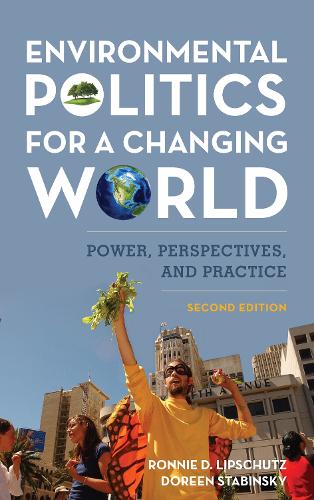
Environmental Politics for a Changing World: Power, Perspectives, and Practice
(Paperback, Second Edition)
Available Formats
Hardback, Second Edition
Published: 12th July 2018
Paperback, Second Edition
Published: 12th July 2018
Publishing Details
Environmental Politics for a Changing World: Power, Perspectives, and Practice
By (Author) Ronnie D. Lipschutz
By (author) Doreen Stabinsky
Bloomsbury Publishing PLC
Rowman & Littlefield Publishers
12th July 2018
Second Edition
United States
Classifications
Tertiary Education
Non Fiction
363.70526
Physical Properties
Paperback
400
Width 150mm, Height 230mm, Spine 14mm
476g
Description
This book argues that environmental problems are, first and foremost, political and, therefore, about power. Using a framework of political economy and political ecology, the authors deconstruct current environmental problems to identify root causes and address those problems through mobilization of collective action and social power. The second edition also offers: Updated examples and stories of political struggles and the actors involved Explicit attention to various forms of power in environmental politics, including structural and social power Local politics and collective action as related to global environmental politics Discussion of emerging issues such as synthetic biology; commodification and financialization of nature, including carbon markets; and geoengineering
Reviews
A welcome critical introduction to the theory and praxis of global environmental politics. -- Malcolm Campbell-Verduyn, University of Waterloo
Lipschutz provides a comprehensive consideration of a wide range of inter-linking topics that I believe to be crucial to any consideration of the global environmental crisis. -- Lee-Anne Broadhead, Cape Breton University
This text provides a foundation from which to understand how fundamental change can occur, and offers a call to action for students to play a role in creating change. -- Loren Cass, College of the Holy Cross
Emphasizes the relevance of issues to students, along with applications for action and activism across scales. -- Desserae Shepston, University of Illinois, Springfield
[THe authors] explore the underpinnings of contemporary environmental problems by adopting a framework of political economy and political ecology. They conclude that the worlds environmental problems are essentially political and therefore can only be understood through a focus on political power. They bemoan the capture of environmental discourse by neoclassical economists. They claim that the discussion of environmental issues is rarely seen as a matter of ethics, but instead as a problem in economics. * CHOICE *
Author Bio
Ronnie D. Lipschutz is professor of politics and, from 2012 to 2018, was provost of Rachel Carson College at the University of California, Santa Cruz. Doreen Stabinsky is professor of global environmental politics at College of the Atlantic in Bar Harbor, Maine.
